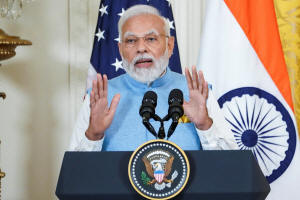Narendra Modi denies religious discrimination exists in India
 Send a link to a friend
Send a link to a friend
 [June 23, 2023]
By Kanishka Singh and Nandita Bose [June 23, 2023]
By Kanishka Singh and Nandita Bose
WASHINGTON (Reuters) -Indian Prime Minister Narendra Modi denied that
discrimination against minorities existed under his government during a
press conference with U.S. President Joe Biden on Thursday, despite
rights groups and State Department reports of abuses.
Biden said he discussed human rights and other democratic values with
Modi during their talks in the White House.
Asked at the press conference what steps he was willing to take to
"improve the rights of Muslims and other minorities in your country and
to uphold free speech," Modi suggested they did not need to be improved.
"Our Constitution and our government, and we have proved democracy can
deliver. When I say deliver - caste, creed, religion, gender, there is
no space for any discrimination (in my government)," Modi told
reporters.
In reports on human rights and religious freedom, the State Department
raised concerns over treatment of Muslims, Hindu Dalits, Christians and
other religious minorities in India while also listing a crackdown on
journalists.
Rights advocates and dozens of lawmakers from Biden's Democratic Party
urged him to raise the issue publicly with Modi, whose Hindu nationalist
Bharatiya Janata Party (BJP) has held power since 2014.

PROTESTERS DECRY MODI'S REMARKS
Dozens of protesters gathered near the White House on Thursday.
"Modi should think why that was the first question asked to him in the
press briefing. It's obvious to all there is rights abuse in India,"
said Ajit Sahi, a protester and advocacy director at the Indian American
Muslim Council.
"Modi's comments (that there is no religious discrimination by his
government) is a complete lie. India has become a black-hole for
religious minorities," said Raqib Hameed Naik, the founder of Hindutva
Watch, a group that monitors reports of attacks on Indian minorities.

India's importance for the U.S. to counter China and the economic ties
between the countries make it difficult for Washington to criticize
human rights in the world's largest democracy, political analysts said.
Biden rolled out the red carpet for Modi on Thursday.
[to top of second column]
|

India’s Prime Minister Narendra Modi
speaks during a joint press conference with U.S. President Joe Biden
at the White House in Washington, U.S., June 22, 2023. REUTERS/Kevin
Lamarque

The only two Muslim women members of the U.S. Congress -
Representatives Ilhan Omar and Rashida Tlaib - along with some other
progressive lawmakers like Representative Alexandria Ocasio-Cortez,
boycotted Modi's address to the Congress on Thursday, citing
allegations of abuse of Indian dissidents and minorities, especially
Muslims.
U.S. Senator Bernie Sanders said Modi's "aggressive Hindu
nationalism" has "left little space for India's religious
minorities."
The benefits of the Indian government's policies are accessible to
everyone, Modi said. Rights groups have asserted, however, that
dissidents, minorities and journalists have come under attack since
Modi took office.
India has slid from 140th in the World Press Freedom Index in 2014
to 161st this year, its lowest point, while also leading the list
for the highest number of internet shutdowns globally for five
consecutive years.
The U.N. human rights office described a 2019 citizenship law as
"fundamentally discriminatory" for excluding Muslim migrants.
Critics have pointed to anti-conversion legislation that challenged
the constitutionally protected right to freedom of belief and the
revoking of Muslim-majority Kashmir's special status in 2019 as
well.
There has also been demolition of properties owned by Muslims in the
name of removing illegal construction; and a ban on wearing the
hijab in classrooms in Karnataka when the BJP was in power in that
state.
"The protection of the Muslim minority in a majority Hindu India,
that is something worth mentioning," former U.S. President Barack
Obama, whom Modi calls a close friend, told CNN in an interview
aired on Thursday.
"If you do not protect the rights of ethnic minorities in India,
then there is a strong possibility that India at some point starts
pulling apart," Obama said of what he would have told Modi now.
(Reporting by Kanishka Singh and Nandita Bose; Editing by Jonathan
Oatis, Grant McCool and Michael Perry)
[© 2023 Thomson Reuters. All rights
reserved.]This material may not be published,
broadcast, rewritten or redistributed.
Thompson Reuters is solely responsible for this content. |